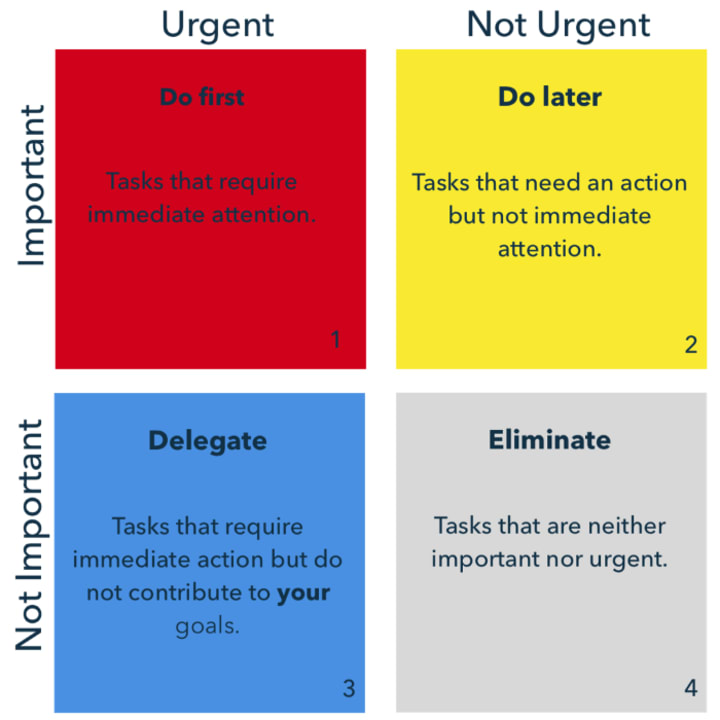Managing Stress as a Working Student
It is normal to be stressed, especially when you are busy.

We've all been stressed at some point in our lives. Whether it is the seemingly endless list of deadlines imposed on us from our employers, or cramming for a test at school the night before. Eventually that stress builds up, affecting the way we act, the way we sleep, and even the way we think.
Simply put, stress takes a toll on our bodies and can take years off our lives. This stress is especially common for those of us who are working while in school.
I am no stranger to feeling stressed or overwhelmed. I work full-time while going to school full-time. The Covid-19 Pandemic has forced me to work from home and this has actually amplified those feelings of stress, which prompted me to look up some techniques for how to overcome it. I have broken down and summarized the three techniques I found most helpful below.
1. Take care of yourself on a physical level.
A lot of guides will tell you to ensure that you get the proper amount of sleep each night, which is good advice on paper. However, this advice is not practical for someone who is feeling overwhelmed. I know that whenever I am stressed I am a restless sleeper, so telling me to sleep better won't cut it. A helpful guide will give you objectives that you can act on, which is exactly what I will be doing for you today.
First, make sure you are staying healthy. Purchase multi-vitamins and take them daily when possible. Your local grocery store should have them. Being healthy also means eating foods that have nutritional value. Try to avoid processed/frozen foods and instead seek out food that is fresh and that uses high quality ingredients. Smaller markets tend to have a better selection than the larger chains.
Another important pillar to staying healthy is exercising regularly. Exercise has a tremendous impact on our perception of reality. With this piece, I want to emphasize that it is absolutely okay to start off small. You can start by taking a walk around your complex or by doing a few pushups throughout the day. The goal of this is to get the body moving and working hard.
The last piece of advice I have in this section is to limit caffeine intake and cellphone usage before bed time. Research has shown that both of these have a negative impact on our ability to sleep as well as the quality of our sleep. You can set an alarm on your phone to remind yourself to stop using it, or perhaps even look into apps that disable cellphone use after a certain time of day.
2. Make a list of what you need to get done.
This one may seem counterintuitive, especially if you are feeling overwhelmed. However, list-making is an excellent way to put our tasks into perspective and to help our brains feel more in control of what we need to accomplish that day.
Some people (myself included), prefer to list their tasks in a matrix that sorts them from most important to least important. A common one used in the business world is the matrix discussed in "The Seven Habits of Highly Effective People" by Stephen Covey, pictured below.

Organizing the day's tasks in this way helps to apply a certain perspective to each one. For example, if I have seven tasks that fall in the 'Not Important, Not Urgent' category, but I have one in the 'Urgent, Not Important' category; I will feel more prepared to address each task in a way that doesn't overwhelm me.
3. Reorganize Your Space
This final tip is one that I think any working professional should do, even if they are not a student. Covid-19 has brought many of us to the remote-working environment, which has its own share of challenges and stressors that weren't necessarily there when we worked in an office environment.
To combat this, I think it is important to separate your workspace from other spaces within the house. That is to say, I think it is important that you designate your workspace as your workspace, and nothing else.
After doing some research, I decided that my desk would only be used during working hours. This means that if I needed to do homework or check my email, I had to do it somewhere else. I designated my desk as my work area, the kitchen counter as my homework area, and everywhere else was fair game to do whatever I wanted.
This simple reorganization helped tremendously. I found that my work stress left shortly after leaving that desk. I didn't think about deadlines, my bosses, or any of my workplace worries when I was not at that desk. This was also true for my homework space. My home became a place where I can feel at ease again.
I hope all or at least some of these were helpful to you. The modern workplace is one of high, often unrealistic expectations. The stress of these expectations coupled with school, social life, or even current events can have an extremely negative impact on your well-being. Take care of yourself before you take care of your responsibilities to other people.
About the Creator
Drew Monette
I enjoy drinking good food and eating good drink, or something to that effect.






Comments
There are no comments for this story
Be the first to respond and start the conversation.